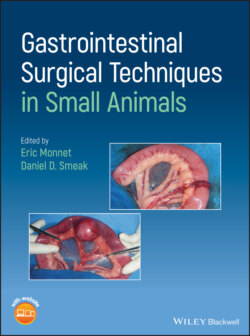Читать книгу Gastrointestinal Surgical Techniques in Small Animals - Группа авторов - Страница 31
2.1.2 Tensile Strength and Knot Security
ОглавлениеMost suture materials out of the package have adequate strength to hold gastrointestinal wound edges together until adequate wound strength is regained (Table 2.1). Knot security is influenced by suture diameter, coefficient of friction, and, most of all, quality of the tied knot. In general, braided suture materials have greater tensile strength than monofilament sutures. Coating of braided sutures negatively affects knot security. Some sutures, particularly glycomer (Biosyn) and polyglytone 6211 (Caprosyn), may been found to have decreased knot security when incubated in canine serum for 24 hours (Marturello et al. 2014). For most sutures within the size range of 3‐0 and 4‐0, at least four square throws are necessary to secure knots effectively. Care should be taken when tying monofilament sutures, particularly nylon, that the knots are pulled tight enough to cause “plastic deformation.”
Tightening monofilament suture materials to ensure security by “plastic deformation” is important, but overtightening of the stitch can occur due to their slippery, smooth surface. With multifilament suture materials, on the second square throw, the knot is set when snugged firmly. Therefore, the tightness of the first throw is locked in place when the second throw is snugged down. Subsequent square throws are placed to ensure permanent knot security. For monofilament sutures, however, tightening the second throw to create plastic deformation will continue to tighten down the stitch because the smooth suture strands slip somewhat. Therefore, use this characteristic when tensioning throws on monofilament suture. The first throw is left somewhat loose, the second throw is tightened until the stitch apposes the tissue edges (but the knot is still not fully plastically deformed), and subsequent throws are firmly tensioned to deform and lock the throws securely together (Zimmer et al. 1991).
